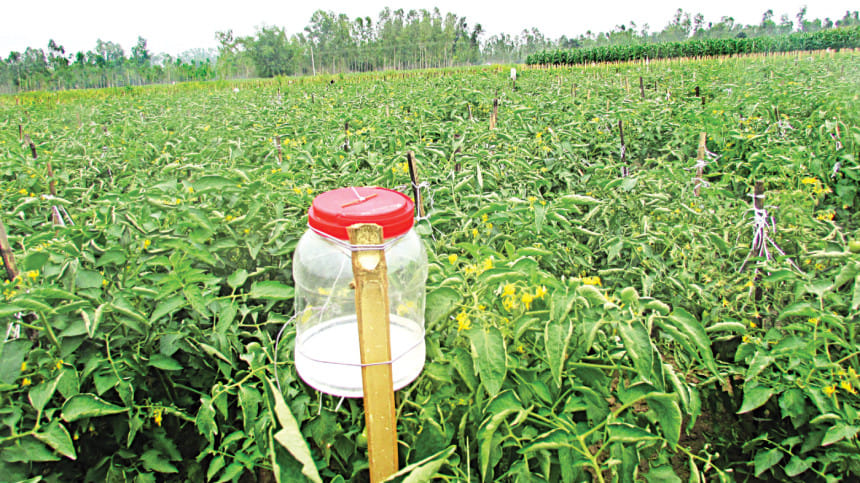Safe food production loses steam

A Tk 58.5 crore project has created interest among farmers to grow foods by using bio-pesticides. And an increased number of growers have switched from using chemical pesticides.
However, they are again returning to chemical pesticides to produce vegetables and other crops, mainly because of higher prices of environment-friendly pesticides and inadequate marketing facilities for safe foods, finds a report by the Implementation Monitoring and Evaluation Division (IMED) of the planning ministry.
The government took up the project, 'Safe Crop Production through Integrated Pest Management (IPM)' in July 2013 to encourage farmers and support them to grow safe food crops through integrated pest management (IPM) practices.
The Department of Agricultural Extension (DAE) implemented the project ending in June 2018.
To assess the impact of the scheme, the IMED has conducted a study recently.
The IMED said the project strengthened safe food production by encouraging farmers to use bio-pesticides and fertiliser through setting up 6,700 farmers' field schools, 6,700 IPM clubs and providing training to farmers.
But many farmers who had been brought under the scheme are now more interested in using chemical pesticides due to increasing demand and high price of bio-pesticides in the markets, it said.
Besides, about 20 per cent of the IPM clubs have already become inactive due to a lack of effective monitoring.
The complicated registration system for the IPM club membership and the reluctance of the club members to deposit monthly fees are also the reasons behind the inactiveness of the club, the IMED data showed.
The major objectives of the scheme, titled "Safe Crop Production through Integrated Pest Management (APM) Policy", were to increase both production and income of farmers in a sustainable and environmentally friendly way, and popularise pest management activities through the use of the IPM method.
The survey showed that after implementation of the scheme, every year 12.7 per cent of new farmers and 10.4 per cent of land have been included in the IPM system.
In the first financial year of the scheme, about 12,361 farmers used the IPM method which has increased to 39,048 and pesticide use has decreased by about 14.26 per cent.
It said due to the use of a proper amount of organic fertilisers and pesticides, the costs of paddy, vegetable and fruit cultivation have decreased by 11.30 per cent, 23.39 per cent and 14.09 per cent per hectare respectively.
Moreover, the yields of paddy, vegetables and fruits have increased by 5 per cent, 7 per cent and 7 per cent respectively.
However, there has been a lack of a proper marketing system for safe crop production, which is discouraging the farmers from cultivating the safe food, it said.
To strengthen the marketing of safe crops, the study suggested the local agriculture offices establish safe vegetable corners in every local market with the help of the local government representatives.
Besides, due to the increasing demand and high price of environment friendly pesticides, farmers are giving up the use of those pesticides and are being prompted again to the use of traditional chemical pesticides.
The IMED said the benefits of the project would be ensured if the price of bio-pesticide and fertiliser was reduced.
Besides, to ensure the benefits of the project, it suggested making the IPM club registration process easier, involving the clubs in all activities of the DAE and strengthening monitoring of upazila-level agriculture offices.
It also suggested to cultivate pest tolerant varieties and strengthen the use of bioagents in the production of safe vegetables.
Ahsanul Haque Chowdhury, director of the project, said he did not get the IMED survey report yet.
"I can't say anything without looking at the survey report," he said.
DAE Director General Md Asadullah said the demand for environment friendly pesticides has grown but in fact its price has not increased.
This is because the benefits of using bio-pesticide once are the same as using chemical pesticides four times, he said.
In fact, interest among the farmers, who are producing safe food crops, is declining as there is no separate market system for them, he said.
If the market system was good and the prices of those crops were high, the interest of farmers in producing safe food would have increased and the process of producing safe food grains would have been more sustainable, Asadullah said.
"So we have given suggestions to the government in this regard. As a part of this, we have already set up safe vegetables markets in different parts of the country, including Dhaka. Those efforts are still ongoing to make the success of this project sustainable. Work will start on a larger scale in the coming days," he said.
In order to encourage the farmers under the project, direct field-level training and education are being provided to the farmers, the DAE DG said, adding that no incentives were provided.
Regarding the inaction in the supervision of the employees of the local agriculture office, he said there was no weakness in the monitoring system.
"How is so much crops being produced if there is weakness in monitoring?" he asked, adding, "Our monitoring is increasing day by day. Now we give suggestions and prescriptions going to the spot."

 For all latest news, follow The Daily Star's Google News channel.
For all latest news, follow The Daily Star's Google News channel. 



Comments